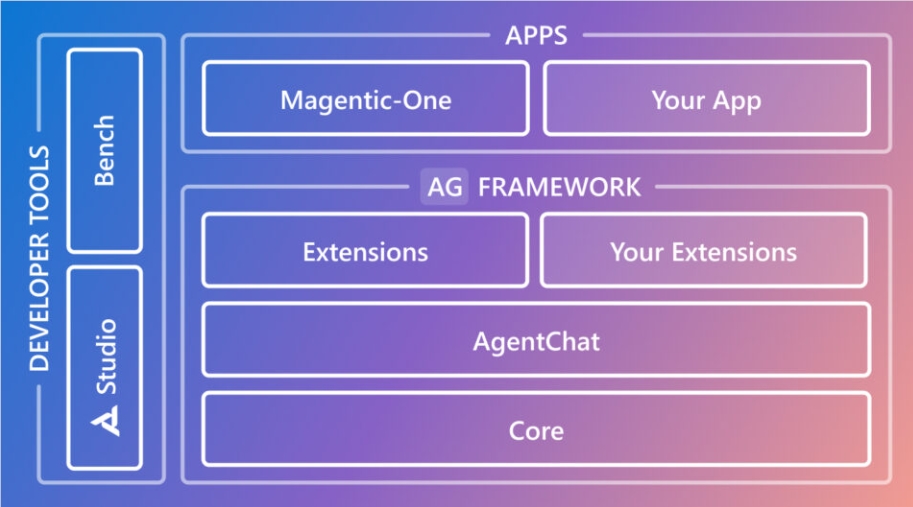Microsoft recently released AutoGen v0.4, an update to its framework for AI agent orchestration. This version aims to improve the flexibility and controllability of AI agents and solve the problems that users encountered when using earlier versions of AutoGen, such as architectural limitations, API inefficiency, and insufficient debugging and intervention functions. This update focuses on enhancing the modularity and extensibility of the framework and providing more powerful monitoring and management tools to meet the growing needs of users for functional expansion and observation capabilities. The improvements in AutoGen v0.4 will provide developers with strong support for building more complex and efficient AI agent systems.
Microsoft recently released AutoGen v0.4, its orchestration framework for AI agents. This update aims to enhance the flexibility and controllability of AI agents to meet user needs for functional expansion and observation capabilities.
Since its launch, AutoGen has received widespread attention from developers, but users have also encountered some architectural limitations, inefficient APIs, and insufficient debugging and intervention functions during use.

In the new version, Microsoft focuses on improving the modularity and scalability of the framework. AutoGen v0.4 introduces an asynchronous messaging mechanism, enabling agents built based on this framework to support event-driven and request interaction modes. This improvement makes it easier for developers to add plug-in components, build long-running agents, and design more complex and distributed agent networks.
In addition, AutoGen v0.4’s extension modules simplify collaborative management of multi-agent teams and advanced model clients, and provide open source developers with better extension management capabilities. In order to improve users' ability to observe agent interactions, AutoGen v0.4 has built-in indicator tracking, message tracking and debugging tools, allowing users to monitor interactions between agents in real time.
The framework also enables cross-language interoperability, currently supporting Python and .NET languages, and will support more programming languages in the future. Microsoft has restructured the AutoGen framework to clearly define the responsibilities between the framework, tools, and applications. The new framework is divided into three levels: the core layer is the basic component of the event-driven system; the AgentChat layer is a task-driven high-level API built on the core layer, with group chat, code execution and pre-built agent functions; first-party extensions are integrated with Azure Integration of code executor and OpenAI model client.
At the same time, Microsoft has also upgraded AutoGen Studio, a low-code interface that can be used for rapid prototyping agents. Users can get real-time agent updates, pause conversations or redirect agents mid-execution, design agent teams via a drag-and-drop interface, import custom agents and get interactive feedback.
Since the launch of AutoGen in October 2023, Microsoft has been committed to simplifying communication between agents. With the continuous development of AI agents, Microsoft has also launched other agent systems, such as Magentic-One, forming a huge AI agent ecosystem. Competitors such as Salesforce, ServiceNow and AWS are also constantly enhancing the capabilities of their agent systems to catch up with Microsoft.
Official blog: https://www.microsoft.com/en-us/research/blog/autogen-v0-4-reimagining-the-foundation-of-agentic-ai-for-scale-extensibility-and-robustness/
Highlight:
AutoGen v0.4 version enhances the flexibility of the AI agent and solves problems reported by users.
The new version supports asynchronous messaging and cross-language interoperability, improving collaboration between agents.
The upgrade of AutoGen Studio's low-code interface makes it easier for users to design and manage agents.
All in all, the update to AutoGen v0.4 has significantly improved the development efficiency and controllability of AI agents, providing a solid foundation for building more powerful AI systems. Microsoft continues to innovate in the field of AI agents, and competition between it and its competitors is also driving the development of the entire industry. In the future, the AutoGen framework is expected to support more programming languages and integrate more functions to further expand its application scenarios.